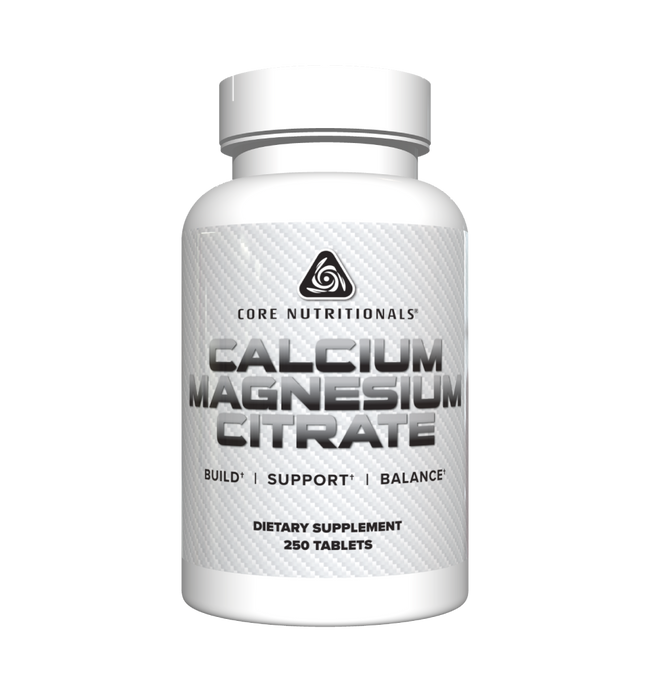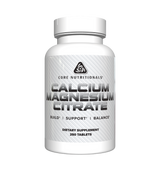
Calcium is likely one of the first nutrients ever consumed by an individual. From the time you were born, calcium was likely introduced for its benefits of bone growth, muscle and nerve function, as well as heart function. As we age, the importance of calcium is also important as the need shifts from growth to maintenance of optimal function. If optimal calcium levels are not met, whether it be in childhood or adulthood the risk of deficiency can lead to less than optimal function and quality of life later on.
Magnesium also plays a role in similar functions of muscle and nerve function, protein synthesis, and bone integrity, as well as being a catalyst for over 300 enzymatic reactions that regulate certain physiological functions in the human body. While magnesium is an essential nutrient, our bodies must receive it from either foods or supplementation. Supplementation can help ensure optimal levels are being met to maintain optimal bodily function. These can include bone and muscle integrity as well as digestion and ability for relaxation and recovery to take place.
These two nutrients are essential on their own but they also work well together. It is important to note that their ratio between each other is important so there is not a competition between them. Core's Calcium/Magnesium Citrate Commoditiy supplies the perfect ratio of calcium to magnesium for the body to maintain optimal functioning.
Calcium
While best-known as the main bioactive in milk, and a compound that contributes to strong bones, calcium has numerous physiological effects in the body – including mediating vascular contraction and vasodilatation, muscle function, nerve transmission, intracellular signaling, and hormonal secretion. Homeostatic regulation of calcium, which the body cannot produce, requires sufficient levels of vitamin D, which can also be found in Core Nutritionals Commodity line of products.
When present in sufficient amounts, calcium is necessary for the adequate formation, function, and remodeling of both bone and teeth. Insufficient levels of calcium are associated with degenerative bone and joint disorders such as osteoporosis, wherein osteoblast (growth) slows or stops; thereby reducing bone mass and density and decreasing bone strength.
Magnesium Citrate
It is difficult to overstate the biological necessity of magnesium. Magnesium is a co-factor in over 300 enzymatic reactions that regulate essential physiological functions such as protein synthesis, bone integrity, glucose homeostasis, muscle and nerve function, and the maintenance and support of healthy blood pressure levels.
Magnesium is also required for the use of the body’s energy currency, ATP. To become biologically active, ATP must be bound to magnesium to form Mg-ATP. In addition, magnesium is necessary for the proper function of cells with calcium and potassium gated ion channels such as heart and muscle cells.
Magnesium itself is an essential nutrient. However, our bodies cannot produce magnesium on their own, so it must be obtained from food or in supplemental means. Magnesium citrate has a role of aiding in the maintenance of healthy magnesium levels, so with most of the body’s magnesium found within bones, muscles, and in non-muscular soft tissue, maintaining normal levels is vital to these structures’ integrity. In addition to these benefits, magnesium citrate can also benefit gastrointestinal distress through its ability to relieve constipation, gas, and bloating, thus establishing normal digestive processes.
Calcium and Magnesium in Combination
We have talked about Calcium and Magnesium for their separate benefits towards optimal health but why are they essential to be taken together?
Calcium, as we discussed is the most abundant mineral found in the body and most of it is found in our skeletal system and is essential for the structural maintenance of the entire skeletal system. Adequate amounts of calcium in your diet can help reduce bone loss by 30 - 50 percent.
There are many forms of calcium that can be made available in a supplemental form. However, in order to be effective, calcium must be properly absorbed by the body. Chelated forms of calcium (calcium citrate, which is in this product) are going to be more effective due to its increased bioavailability for the body. For maximum absorption, calcium is best taken with a meal.
Magnesium, as we also discussed is a mineral that plays an important role in maintaining healthy bones, muscle function, and nerve function. It contributes to increased bone density and helps prevent the onset of osteoporosis.
Since magnesium works closely with calcium, it is important to have an appropriate ratio of both minerals in order for them to be effective. A good rule of thumb is a 2:1 calcium-to-magnesium ratio. For example, if you take 1000mg of calcium, you should also take 500mg of magnesium (which is what is used in this product). If this ratio is off, there can be an internal competition for intestinal absorption between these two minerals, and their effects can be diminished. This has been seen in studies especially when calcium intake is much higher than magnesium. This can be important information, as the typical diet of most people often shows calcium consumption to be much higher than magnesium. Understanding this importance of balance between these two minerals can be necessary for maintaining optimal physiological function.











